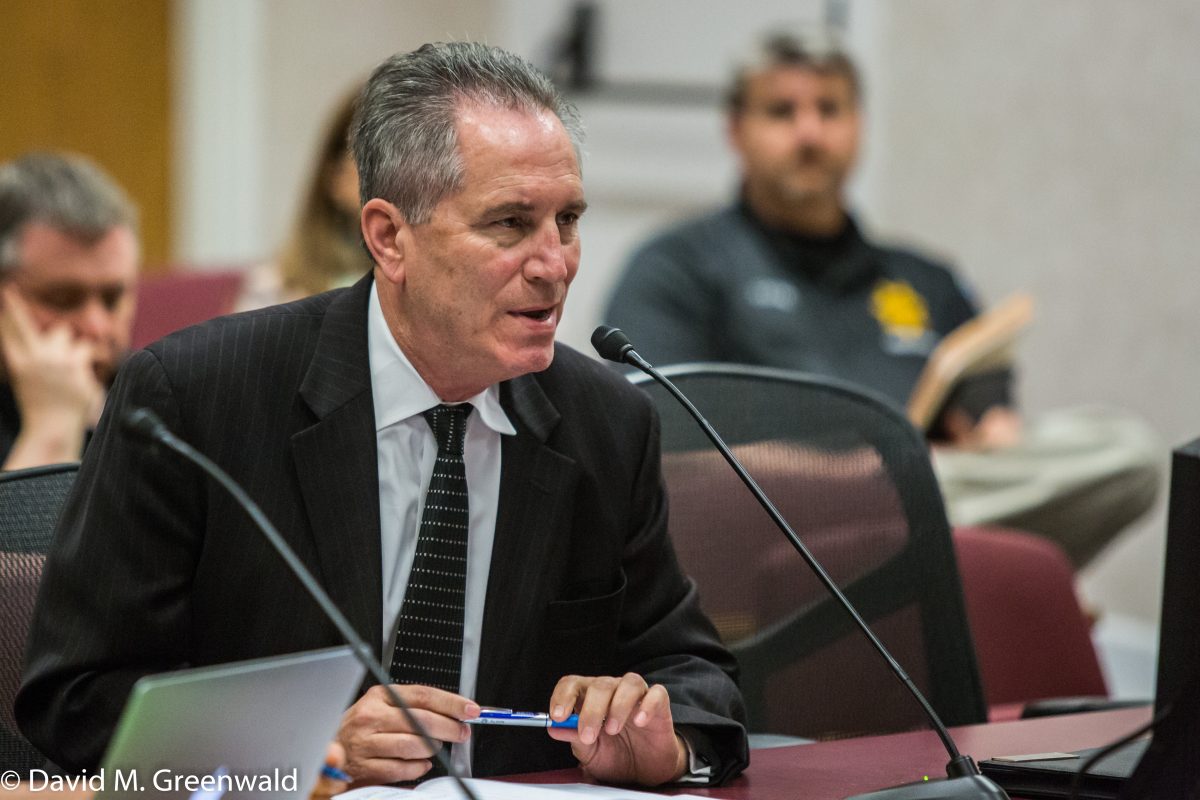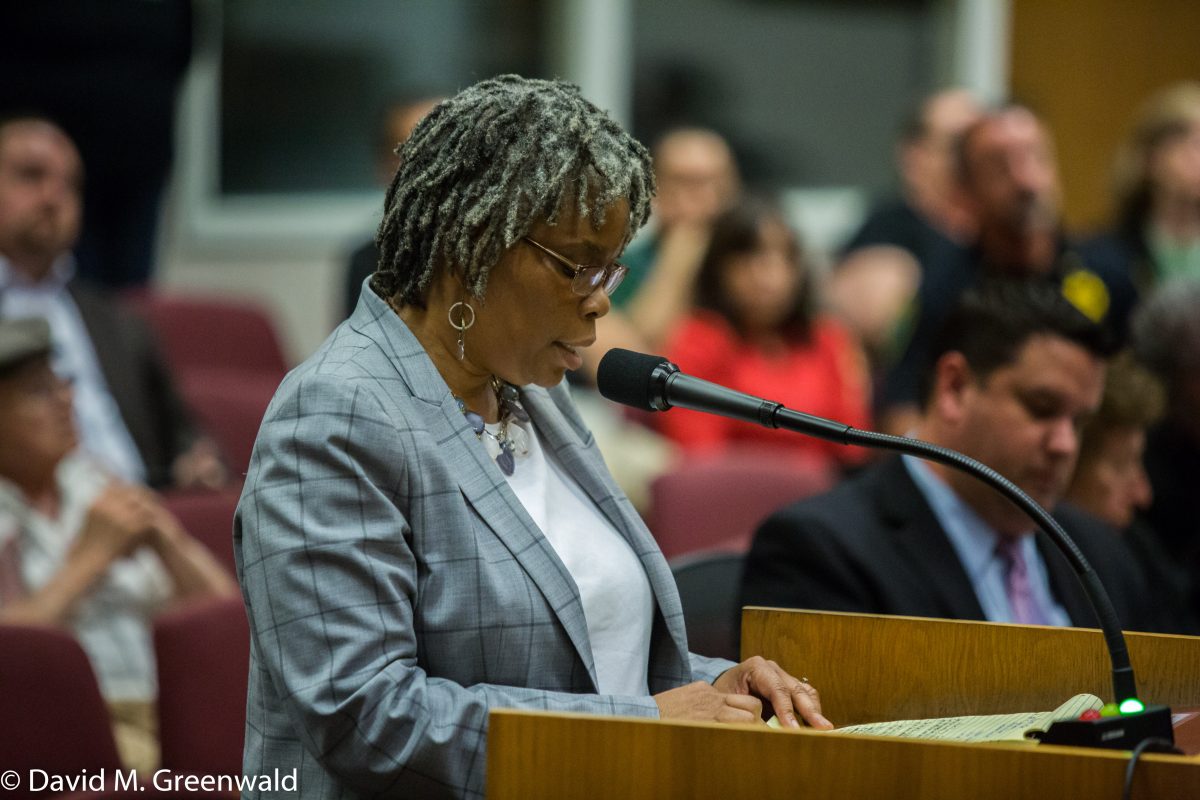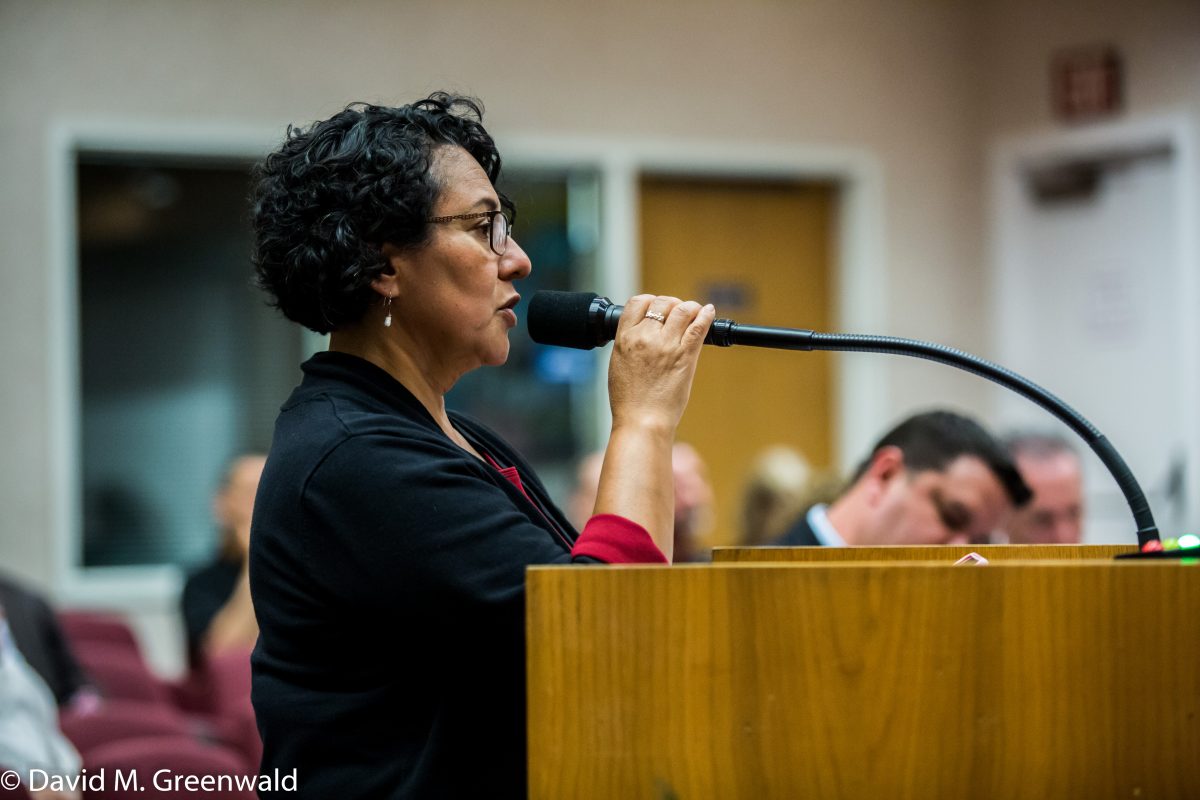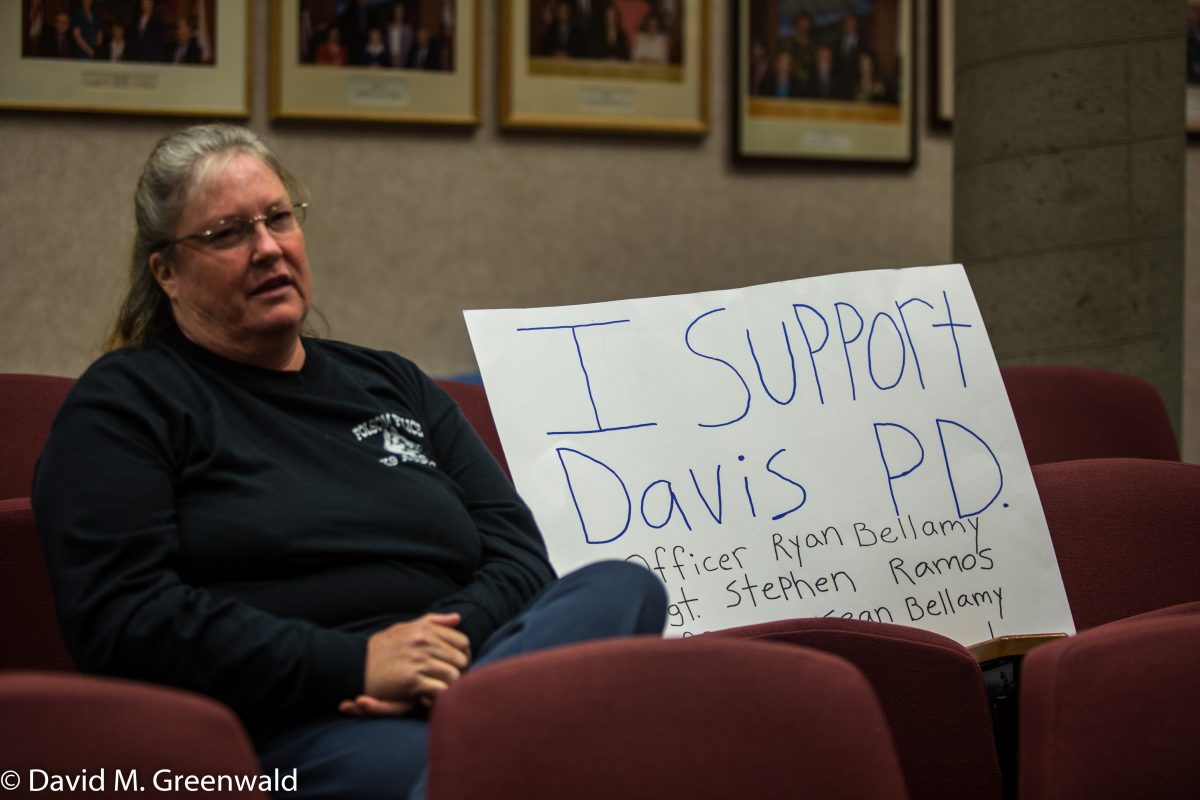
The Davis City Council listened patiently as 22 members of the public spoke during public comment on the Gennaco report about the Picnic Day incident last year. The council then unanimously passed two recommendations.
Mayor Robb Davis moved that that the city manager return to council by late June or early July “with a point by point response to the interim police auditor’s recommendations.” This would include a summary, links to relevant policy changes, timelines for those that are still to be changed, and/or rationales for not immediately addressing the recommendations “and that that be reviewed by the auditor before it comes to the council.”
The motion was seconded by Rochelle Swanson and passed by the council unanimously. Chief Darren Pytel indicated everything on the recommendation list has either been done already or is in progress.
The second motion was that “we send a formal request from this body, to the district attorney requesting conclusion of officers and police leaders in their restorative justice process so that the young people involved can describe the harms they too have experienced in this event and have an opportunity to explore with the police what can be done to make all harms right per the basic tenants of restorative justice.”
Mr. Davis said that has to involve voluntary participation. Councilmember Will Arnold seconded the motion and it too passed unanimously.

The overwhelming percentage of the public that came out and spoke on this evening did so from the standpoint of criticizing the police actions on that day and urging the council to take steps to remedy it. In a separate item, the council heard the report from Barbara Attard and Kathryn Olson regarding the creation of a dual-process police oversight body that includes an auditor and a citizen’s police advisory board.
This was the first time that the council had a chance to weigh in on what had taken place last Picnic Day.
City Manager Mike Webb called “the period of time that this transpired from the beginning of this investigation process and the incident itself and the lack of early and clear communication to the  community around timing and expectations is definitely regrettable.”
community around timing and expectations is definitely regrettable.”
He said, “Clear communication early and often and clarity of the investigation process are necessary to ensure transparency and trust.”
Mr. Webb stated that “in this instance, certain decisions and resulting acts by some of the officers involved did not meet the highest standards of conduct and service we expect from members of the police department.”
He cited in particular the decision to move close to the crowd in an unmarked vehicle, the use of inappropriate language, and the failure for two of the officers to wear attire making them immediately identifiable, factors that he said “played a role in the initial confusion regarding whether the officers in the van were police.” He said that “the actions are regrettable and the police chief has apologized for breaches of departmental policy.”
This was the first opportunity as well for members of the city council to speak out. Will Arnold read a statement he wrote before the report was released that fairly accurately identified what had gone wrong.

Mr. Arnold said, “Still to this day, I don’t know if I’m stepping beyond, of things a councilmember ought to say about an incident like this about judg(ing) professionals in a profession that I cannot even pretend to understand their day to day.
“There are not a lot of surprises here,” he said. “So maybe I should have said this a month ago or six months ago… Or maybe I shouldn’t be saying it now.
“If my silence over the last year caused or exacerbated harm or feelings of lack of transparency in the community, I apologize and will try to do better next time.”
He also expressed his “appreciation for the willingness of our police chief to accept personal responsibility in this for aspects in which he was directly involved and which were clearly problematic.
“I’m encouraged by the progressive policy direction that this department has taken under Chief Pytel’s leadership,” he said.
Councilmember Rochelle Swanson described her experience of raising two sons of color, where “you literally try to protect them from everything and live in communities like Davis and then have to come to terms with the fact that there’s not a lot you can do. You just have to go with God and hope they can be protected.”
She said, “I do think we made progress. I’m heartened by the changes that we’ve made and I appreciate… the changes that have happened over time… I know that there has been progressive change that has happened over the decades, but we do have a long way to go.”
She pushed for there to be a standing subcommittee. She agreed with the suggestion to release video on a set schedule which will allow the public to know what occurred and what to expect.
She said, “It’s clear that we could have gotten answers sooner – but we didn’t.”

Councilmember Lucas Frerichs said, “Regarding my silence over the course of the past year, I erred on the side of caution. Particularly with regards to this, this was a personnel issue. But also an ongoing investigation that is something whether right or wrong, through my experiences… been advised to do in situations of personnel matters.
“I certainly feel like I no longer have to remain silent,” he said. “This event should never have happened in the first place.” He added, “It entirely could have been avoided.”
He enumerated his list of concerns from driving the vehicle into the group of pedestrians, coming out swinging, and said that “had I been one of these individuals there as this vehicle approached into that intersection I absolutely would have acted similarly in self-defense.”
He cited the issuing of the press release “when conflicting facts existed is another issue certainly that I find unacceptable.
“The hiring of John McGinness, thankfully that was rectified exceptionally quickly,” he said.
“I’m personally sorry for this situation because it seems again like it all could have been avoided,” he continued. “The question is what next, moving forward. For me, bottom line, actions speak louder than words.”
He said that the changes have put us “forward on a path to rebuild community trust.”
Mayor Robb Davis said, “The Gennaco report was the open window that we were looking for into the Scott report. I didn’t expect it to be what it was, but I’m thankful for it.”

The mayor said he was really disappointed that he was unable to read the Scott report. He said, “I felt like I had betrayed people in the community.”
He said, “The Gennaco report has given us the necessary window into the McGregor Scott report that helps us better sort through and gain a better understanding.”
The mayor talked about the questioning of technique and the questioning of technicians. He said that the police are technicians. He said, “Like many technicians, it’s hard to question them. Many will say they’re the experts. Let them deal with them.”
He said, “We must question them. We must judge them.” He explained, “I view the Gennaco report as a questioning fundamental of technique.” He said that the independent auditor is a role of “questioning the technician.”
The mayor added that the role of elected officials is to play that role of questioning. He said that “sometimes we do it well and sometimes we listen too narrowly to the technicians and ignore the larger consequences. I acknowledge my role in that.”
The mayor mentioned the Picnic Day 5 by name and stated, “I don’t know them.
“The response that they had on Picnic Day did not occur in the absence of provocation,” he said.
He said that this case from the start screamed for a restorative process. He said, “I waited because I didn’t think anything I said or wrote about would make any difference.” He added, “I was wrong about that.
“We do have a restorative process now,” he said. “I believe we can still achieve in that process the ability of the police – at least some of them, the ability to sit with those young people and talk about the harms that were done. Try to determine how those harms can be made right today.”
—David M. Greenwald reporting







Is the Gennaco report an evaluation or summary of the Scott report?
Or is it strictly Gennaco’s own views?
Both. He originally audited the report but he realized there was a lot missing, so he went back and added to the investigation as I understand it.
So who was able to read the Scott report?
Why did we need a second report?
It would be curious to know what parts Gennaco added?
How was Gennaco chosen? Based on what criteria?
Gennacco, Harriet, Mike, Darren for sure. Not the council.
“Why did we need a second report?”
Because the Scott report couldn’t be released to the public or council.
“It would be curious to know what parts Gennaco added?”
Read the report, he lays it out in there.
“How was Gennaco chosen? Based on what criteria?”
He was hired by the city. He had a very good reputation and was recommended by Barbara Attard and Kathryn Olson.
What are Gennaco’s political leanings?
In all my years I have never seen what I consider a “fair” report on an issue with police since “regular” people never do the reports, they are either prepared by the cops (or friends of cops) that almost always try and cover up bad behavior or prepared by “civil rights” groups (that often tell me they hate all cops) that work to make the cops look bad and cover up bad behavior of the people the cops arrested or shot…
P.S. For Keith O:
“Prior to starting OIR, Mike was Chief of the Civil Rights Section at the United States Attorney’s Office for the Central District of California. He also served for ten years as a trial attorney with the Civil Rights Division at the Justice Department in Washington, D.C. During his time as a federal prosecutor, Mike supervised over 20 federal grand jury investigations into police misconduct. He conducted a number of successful civil rights prosecutions against police officers for excessive force, including officers of the Los Angeles Police Department, the Los Angeles Sheriff’s Department, and federal immigration detention officers.”
https://www.oirgroup.com/michael-gennaco
Yes Ken, I had also read that earlier. The only reason I ask about Gennaco’s political leanings is the Vanguard was sure concerned about John McGinness’s and McGregor Scott’s political affiliations.
https://www.davisvanguard.org/2018/02/commentary-mcgregor-scott-proving-less-independent/
https://www.davisvanguard.org/2017/05/commentary-inappropriate-choice-head-investigation/
Gennaco did the report on Kelly Thomas’ clearing and it was pretty clear reading it that he could be fair to both sides. You guys seem to miss that the officers here were cleared on both the use of force and bias policing.
> “civil rights” groups (that often tell me they hate all cops)
So, to get this straight, “civil rights” groupS, OFTEN, tell YOU, they HATE, ALL, cops?
Which groups?
How often? Why wasn’t once enough?
They HATE, ALL cops, ever single one?
And why do multiple “civil rights” groups contact YOU, personally?
I’m not arguing your point, I’m just really curious about this statement.
Working in politics in SF 20-30 years ago I met a lot of people involved with “civil rights” and “police accountability” and more often than not (after they find out I’m not a cop, I’m not related to any cops and I agree with them that cops often break the law) will tell me they hate all cops and think they are “all” corrupt.
P.S. It is interesting that Alan did’t doubt me when I wrote that sometimes “cops cover up bad behavior” but seems to doubt that even a single person from a civil rights group (that often marches chanting “No justice, no peace. No racist police”) would “hate” cops…
P.P.S. When David wrote: “he could be fair to both sides” I was thinking David could also add “like CNBC is fair and balanced” since after Sheriff John McGinnis was pushed out a conservative friend in Sacramento (who thinks Fox is fair and balanced) didn’t understand why a fair moderate (in his view) like the retired Sheriff was not heading the investigation…
Oh, no, I would have bought single person, even most — it was the ALL that I questioned.
“How was Gennaco chosen? Based on what criteria?”
“Michael Gennaco is a nationally recognized expert on law enforcement reform and accountability systems. He was the Chief Attorney of the Office of Independent Review for Los Angeles County and is a founding Principal of OIR Group. Mike has performed a number of monitoring tasks, audits and reviews for a federal judge, special masters, and other governmental entities. He has assisted law enforcement entities throughout the country with constitutional policing issues, critical incident reviews, internal affairs investigations, and design of effective oversight mechanisms. Under his leadership, OIR Group has become a resource for numerous California cities grappling with officer-involved shootings and other critical incidents in an effort to bridge the gap between the police and the communities they serve and to utilize those incidents as learning tools.
Prior to starting OIR, Mike was Chief of the Civil Rights Section at the United States Attorney’s Office for the Central District of California. He also served for ten years as a trial attorney with the Civil Rights Division at the Justice Department in Washington, D.C. During his time as a federal prosecutor, Mike supervised over 20 federal grand jury investigations into police misconduct. He conducted a number of successful civil rights prosecutions against police officers for excessive force, including officers of the Los Angeles Police Department, the Los Angeles Sheriff’s Department, and federal immigration detention officers.
Mike received a J.D. from Stanford University and his B.A. from Dartmouth College.”
from OIR
https://www.oirgroup.com/michael-gennaco
BTW, have the Bellamy brothers and Ramos been disciplined in any substantive fashion?
I was told to check their status next week
Since you are replying to my comment check what’s status?
I thought I was answering John’s question about the status of the Bellamy brothers.
Meanwhile we have several recent examples of where police agencies adopted liberal approaches to detailing with suspects exhibiting threatening behavior and it resulted in many other people injured and dead.
What is it that you disagree with here? As I understand it, McGregor Scott’s report didn’t say anything different from Mike Gennaco’s.
How could you possibly know this?
I asked. Plus if you read Gennaco’s report, he tells you.
I don’t get how our council members aren’t allowed to read the report but you can be told that the “report didn’t say anything different from Mike Gennaco’s”?
Because the report was a personnel document, I asked a very generic question.
Also if you look at page 3 of the report – you’ll see that the five findings come from the OHS report. I get the feeling you’re asking these questions and haven’t actually read the report yourself.
Mine was just a general comment about the practice of appeasing the law enforcement reactionaries through more and more restrictive police protocol until there comes a time when the police are ineffective at providing protection.
Crime is on the rise about the time we would expect it to be on the rise with the more recent work of the law enforcement reactionaries to succeed in leveraging the mistakes of a few to muzzle the whole.
Jeff M
Sources please ?
Surprised to see this comment coming from a member of the council. I’m not planning to comment on what I saw in that video, or how one perhaps should have reacted. (Suffice it to say that I don’t agree with Lucas.)